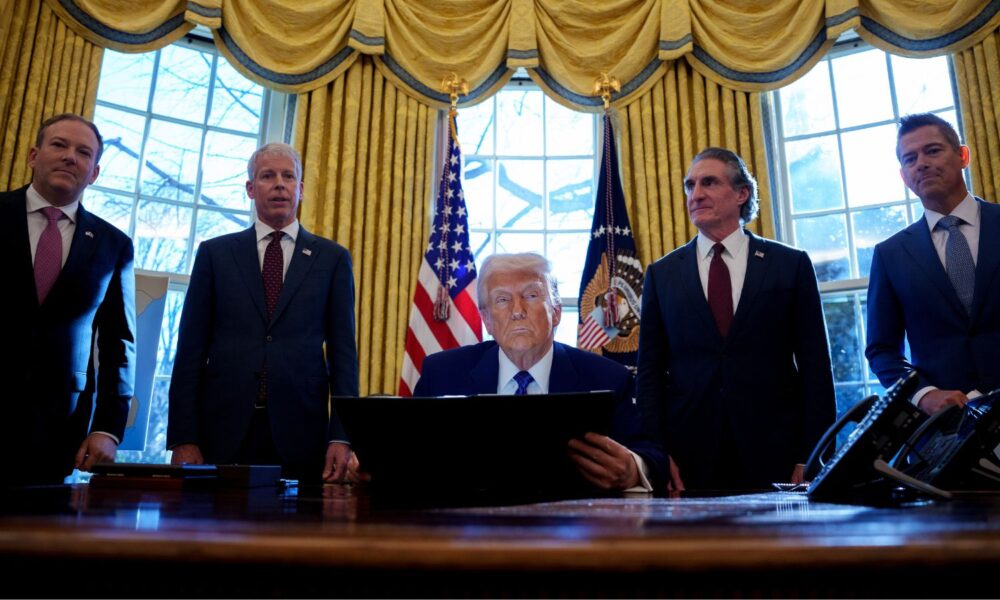This month, the Union of Concerned Scientists (UCS) filed comments and submitted a letter signed by more than 1,000 scientists opposing the Environmental Protection Agency’s (EPA’s) proposal to rescind the 2009 Endangerment Finding, which affirmed the agency’s responsibility and obligation under the Clean Air Act to regulate the health-harming heat-trapping emissions driving climate change. At the heart of the Trump Administration’s attempt to dislodge this cornerstone of federal climate action is a polished piece of fossil fuel disinformation: a sham report by a so-called Climate Working Group convened in secret by US Department of Energy (DOE) Secretary Chris Wright and US EPA Administrator Lee Zeldin.
Hundreds of experts submitted comments exposing the report’s misleading use of data and cherry-picked conclusions. The American Meteorological Society issued a powerful statement identifying five foundational flaws that place the report at odds with scientific principles and practices. Texas A&M University climate scientist Andy Dessler worked with 85 experts and compiled a 459-page response to the report, exposing fundamental errors that misrepresent the overwhelming evidence of human-caused climate change. UCS filed comments underscoring the ways this deeply flawed DOE-commissioned document distorts science, delays action, and undermines public understanding of the crisis we are facing.
Together with the Environmental Defense Fund (EDF), UCS is suing to enforce federal legal requirements that apply to the committee that wrote the report. The lawsuit—against the DOE and Secretary Christopher Wright in his official capacity as head of that department, the EPA and EPA Administrator Lee Zeldin in his official capacity as head of that agency, and the Climate Working Group—argues that the establishment and use of the Climate Working Group violates the Federal Advisory Committee Act (FACA), which requires fairly balanced viewpoints, public participation and transparency for committees like this one that advise the federal government on policy. On September 17, the court granted partial summary judgment as sought by UCS and EDF, ruling that the Climate Working Group is not exempt from FACA under an exception the government had argued should apply. The case is ongoing.
The scientific critiques are extensive and compelling, and they prompted me to scrutinize the authors behind the report. Who wrote it, and what do their records tell us about why the science they produced was so deeply flawed? Not surprisingly, these scientists’ names and viewpoints were familiar from previous research by UCS and others, congressional testimony, and other public appearances.
John Christy: Winning fossil fuel friends by distorting climate data to minimize warming
John Christy, a professor at the University of Alabama in Huntsville, has repeatedly advanced analyses of atmospheric data that independent researchers have shown to be flawed. Even after corrections brought those records into line with surface temperatures and model projections, Christy has continued promoting outdated interpretations.
At the same time, Christy has been a familiar presence in fossil fuel industry-funded circles including the Heartland Institute, Cato Institute, Competitive Enterprise Institute, Independent Institute, Global Warming Policy Foundation, and George C. Marshall Institute. He was even recommended for a federal climate role by ExxonMobil’s top lobbyist in the early 2000s.
As noted by Inside Climate News, he has frequently been invited to testify before Congress by “Republican lawmakers looking to cast doubt on the science of human-caused climate change.” In 2013, for example, Christy testified before the House Science Committee, chaired by then-Representative Lamar Smith. Smith, a recipient of significant fossil fuel industry campaign contributions, surrounded himself with staff tied to industry lobbying and PR firms. Under Smith’s leadership, the House Science Committee even subpoenaed UCS as part of an effort to intimidate scientists and accountability advocates.
Christy’s role in the Climate Working Group’s report likely ensured that long-debunked science was presented as if it were credible dissent.
Steven Koonin: Emphasizing doubt and serving fossil fuel interests
Steve Koonin has become known for portraying climate science as “unsettled.” His arguments consistently highlight uncertainty while downplaying the weight of evidence that climate change—caused primarily by burning oil, gas, and coal—is happening. This framing—promoted by ExxonMobil in a notorious 2000 New York Times advertorial—has been widely criticized by Koonin’s scientific peers for misrepresenting the state of knowledge.
Koonin’s career also links directly to fossil fuels. He was BP’s Chief Scientist for five years and later joined think tanks such as the Hoover Institution, which received $430,000 from ExxonMobil from 1998-2019, and the American Enterprise Institute, which has received millions of dollars in funding from ExxonMobil and over $2 million from Koch-related foundations. The selective way Koonin treats evidence aligns neatly with the interests of polluting industries.
Roy Spencer: Analytic errors and fossil fuel ties
Roy Spencer, another researcher at the University of Alabama, has co-authored analyses that independent scientists found contained serious errors. For example, a paper he co-wrote was so flawed that the journal editor resigned, acknowledging it should not have been published. Spencer was a signatory of the 2017 petition organized by retired MIT professor Richard Lindzen of the Cato Institute urging President Trump to pull out of the United Nations Framework Convention on Climate Change (UNFCCC). The claims in the petition were debunked by UCS.
Spencer also has close ties to networks that deny climate science, including the Cornwall Alliance, which the Guardian says “essentially believes God wouldn’t let damaging climate change happen,” and which, according to DeSmog, “claims environmentalism is ‘one of the greatest threats to society and the church today.’” Spencer was also formerly a visiting fellow at the Heritage Foundation.
According to PR Watch, in 2016 Spencer was listed as a creditor of Peabody Energy (at the time the world’s largest private-sector, publicly traded coal company) in its bankruptcy filings along with other figures from the network of climate denial and disinformation (such as Willie Soon, whose fossil fuel industry-funded contrarian climate science research was exposed in UCS’s 2015 Climate Deception Dossiers). PR Watch notes that Spencer was paid $4,000 to serve as an expert witness for Peabody Energy in an administrative hearing on the social cost of carbon in Minnesota.
Judith Curry: Cashing in on doubt
Judith Curry, professor emerita at the Georgia Institute of Technology (and who resigned from the university in 2017 citing the “craziness in the field of climate science”), has built a post-academic career critiquing mainstream climate assessments as overstating risks.
Her record includes notable instances where her work did not stand up to scrutiny. In Held v. State of Montana, a landmark climate case brought by young people, Curry was hired as an expert witness for the state. She charged at least $30,000 for her report, yet admitted in her deposition that she had never conducted research on Montana’s climate. The state ultimately excluded her testimony.
Curry’s consulting firm works with utilities, insurers, and fossil fuel companies, which has raised concerns about potential undue influence of commercial interests over her public positions. Her involvement with groups such as the Global Warming Policy Foundation and Heartland Institute reinforces the picture of a climate skeptic, whose skepticism is consistently aligned with industry agendas.
Ross McKitrick: Economics that excuse pollution
Ross McKitrick, an economist at the University of Guelph, has repeatedly advanced arguments that downplay the costs of fossil fuel pollution. His work often isolates narrow aspects of environmental economics while ignoring broader scientific evidence on climate risks, leading to conclusions that are inconsistent with mainstream climate science. In a public response to the Climate Working Group report, leading environmental and climate economists commented that its findings are “woefully out of date” and rely on “an array of fallacies.”
As the University of Oxford’s Ben Franta has observed, the role of some economists in opposing climate policies has received less attention than the role of physical scientists. In a 2021 study focused on an influential group of economists hired by the petroleum industry whose work played a key role in undermining numerous major climate policy initiatives in the US over a span of decades, Franta concluded that “further attention is needed on the role of economists and particular economic paradigms, doctrines, and models within climate politics and the perpetuation of fossil fuels.”
McKitrick is a senior fellow at the Fraser Institute, which has received funding from fossil fuel interests including the Charles Koch Foundation. He has endorsed denialist declarations, collaborating with groups like the Heartland Institute and CO2 Coalition that spread climate science disinformation. In 2023, a month after the publication of a peer-reviewed study led by my UCS colleagues linking worsening forest fires across the western United States to fossil fuel companies, McKitrick wrote that “science tells us” forest fires aren’t becoming more common. In fact, there is a growing body of evidence highlighting the dangerous connections between heat-trapping emissions and wildfires.
A web of contrarian science and fossil fuel industry influence
Each of these authors has a record of disputed or selective analyses that deny or downplay the severity of the climate crisis, and each has ties to fossil fuel–funded institutions or front groups that benefit from such narratives. The Trump Administration’s choice to elevate these five voices is not a neutral decision: it reflects a political choice to prioritize contrarianism embraced by a tiny minority of scientific voices over credible, peer-reviewed research that represents the overwhelming scientific consensus.
The problem isn’t just who funds or amplifies these contrarian voices. Their science itself is bad, built on errors, cherry-picked data, and arguments that have been repeatedly rejected by the broader scientific community. When flawed science and fossil fuel influence reinforce each other, the result is a dangerous distortion of public understanding and obstruction of science-based policymaking.
To reveal the extent of fossil fuel industry influence on the proposed rollback of the endangerment finding—based in part on the Climate Working Group’s deeply flawed report—Senator Sheldon Whitehouse, Ranking Member of the Senate Environment and Public Works Committee, has launched an investigation, requesting documents from dozens of fossil fuel companies, trade associations, and polluter-backed groups by September 30.
The sham Climate Working Group report follows a disinformation playbook that UCS has long documented, through which industry-backed actors create the illusion of legitimate debate, exploit uncertainty, and delay action. Big Tobacco was among the first to deploy these tactics and networks, and the fossil fuel industry continues to unleash and hone them, as my team at UCS showed in our latest report, Decades of Deceit.
The flood of expert comments on the Climate Working Group report demonstrates that the scientific community is pushing back hard against these tactics. But this debacle underscores the urgent need for stronger, more consistent safeguards against political and corporate interference in public policy in the face of Trump administration efforts to weaken scientific integrity policies across federal agencies—read more in this blog by my colleague Jules Barbati-Dajches. Fortunately, science-based law and policy is holding its own globally: my colleague Delta Merner explains that international legal bodies are affirming the connections between science, responsibility, and justice.
Public policy must be grounded in independent science, not in fatally flawed analyses advanced by people with deep ties to polluting industries.
Delta Merner and Hannah Poor contributed to this post.

